This is an incomplete list of multinational festivals and holidays.
Islam
Secular and multiple religions
The following festivals have no fixed date in the Gregorian calendar, and may be aligned with moon cycles or other calendars. [15]
Many religions whose holidays were formulated before the worldwide spread of the Gregorian calendar have been assigned to dates either according to their own internal religious calendar, or moon cycles, or otherwise. Even within Christianity, Easter is a movable feast and Christmas is celebrated according to the older Julian calendar instead of the Gregorian by some sects of the religion.
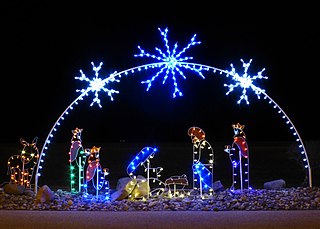
Christmas is an annual festival commemorating the birth of Jesus Christ, observed primarily on December 25 as a religious and cultural celebration among billions of people around the world. A feast central to the liturgical year in Christianity, it follows the season of Advent or the Nativity Fast, and initiates the season of Christmastide, which historically in the West lasts twelve days and culminates on Twelfth Night. Christmas Day is a public holiday in many countries, is celebrated religiously by a majority of Christians, as well as culturally by many non-Christians, and forms an integral part of the holiday season surrounding it.

December is the twelfth and final month of the year in the Julian and Gregorian calendars. Its length is 31 days.
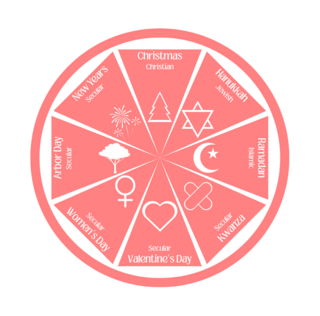
A holiday is a day or other period of time set aside for festivals or recreation. Public holidays are set by public authorities and vary by state or region. Religious holidays are set by religious organisations for their members and are often also observed as public holidays in religious majority countries. Some religious holidays, such as Christmas, have become secularised by part or all of those who observe them. In addition to secularisation, many holidays have become commercialised due to the growth of industry.
A moveable feast is an observance in a Christian liturgical calendar which occurs on different dates in different years.

The New Year is the time or day at which a new calendar year begins and the calendar's year count increments by one. Many cultures celebrate the event in some manner. In the Gregorian calendar, the most widely used calendar system today, New Year occurs on January 1. This was also the first day of the year in the original Julian calendar and the Roman calendar.

The liturgical year, also called the church year, Christian year or kalendar, consists of the cycle of liturgical seasons in Christian churches that determines when feast days, including celebrations of saints, are to be observed, and which portions of Scripture are to be read either in an annual cycle or in a cycle of several years.
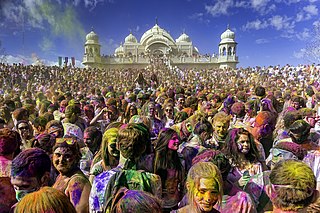
A religious festival is a time of special importance marked by adherents to that religion. Religious festivals are commonly celebrated on recurring cycles in a calendar year or lunar calendar. The science of religious rites and festivals is known as heortology.
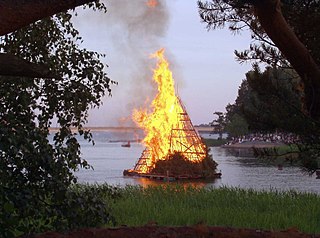
A bonfire is a large and controlled outdoor fire, used either for informal disposal of burnable waste material or as part of a celebration.

In the Gregorian calendar, New Year's Day is the first day of the calendar year, 1 January. Most solar calendars begin the year regularly at or near the northern winter solstice, while cultures and religions that observe a lunisolar or lunar calendar celebrate their Lunar New Year at less fixed points relative to the solar year.

Midsummer is a celebration of the season of summer occurring near the date of the summer solstice which is known in solar reckoning as the mid-point of the season. As the precise date of the summer solstice can vary from year to year, different traditions may celebrate or fix Midsummer at different dates or under different names occurring on or around the actual solstice. A variety of traditions have developed often rooted in regional, spiritual, or religious practices. Traditionally, Midsummer is on the first Saturday after June 20th, though it is often celebrated on Midsummer's Eve, on the day before.
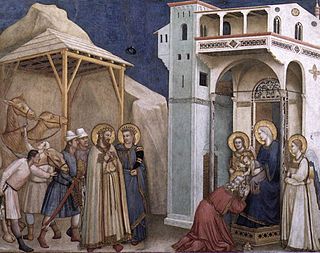
The Twelve Days of Christmas, also known as the Twelve Days of Christmastide, are the festive Christian season celebrating the Nativity.

In the United States, public holidays are set by federal, state, and local governments and are often observed by closing government offices or giving government employees paid time off. The federal government does not require any private business to close or offer paid time off, as is the case for most state local governments, so employers determine which holidays to observe.
Bangladesh has numerous public holidays, including national memorial, religious and secular holidays of Bengali origin. The Bengali traditional calendar, known as Baṅgābda is the national and official calendar in Bangladesh. The holidays are celebrated according to Bengali, Islamic or Gregorian calendars for religious and civil purposes, respectively. Religious festivals like Eid are celebrated according to the Islamic calendar whereas other national holidays are celebrated according to the Bengali and Gregorian calendar. While the Islamic calendar is based on the movement of the moon, it loses synchronization with the seasons, through seasonal drift. Therefore, some public holidays are subject to change every year based on the lunar calendar.

Christmastide, also known as Christide, is a season of the liturgical year in most Christian churches.

Epiphany, or Eid al-Ghitas, also known as "Theophany" in Eastern Christian tradition, is a Christian feast day commemorating the visit of the Magi, the baptism of Jesus, and the wedding at Cana.

The observance of Christmas around the world varies by country. The day of Christmas, and in some cases the day before and the day after, are recognized by many national governments and cultures worldwide, including in areas where Christianity is a minority religion. In some non-Christian areas, periods of former colonial rule introduced the celebration ; in others, Christian minorities or foreign cultural influences have led populations to observe the holiday.
The Old New Year, or the Orthodox New Year, is an informal traditional holiday, celebrated as the start of the New Year by the Julian calendar. In the 20th and 21st centuries, the Old New Year falls on January 14 in the Gregorian calendar.

Bayram is the Turkic word for a nationally-celebrated festival or holiday, applicable to both national and religious celebrations.
Lists of holidays by various categorizations.